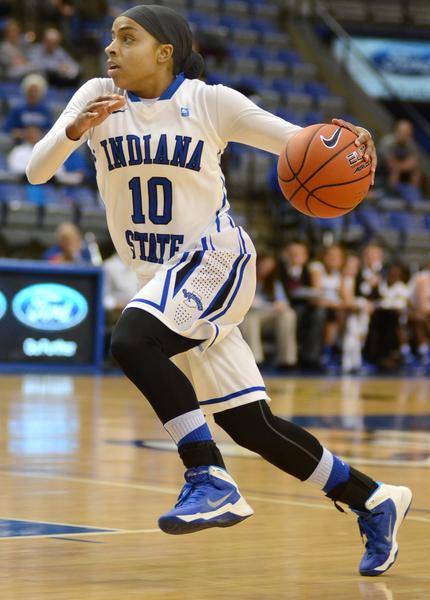 MEMPHIS – A basketball phenomenon, Bilqis Abdul-Qaadir has always dreamed of a flourishing future as a professional basketball player who has reserved the title of the best player in the state during her high school years.
MEMPHIS – A basketball phenomenon, Bilqis Abdul-Qaadir has always dreamed of a flourishing future as a professional basketball player who has reserved the title of the best player in the state during her high school years.
“As of right now I’m really in a holding pattern because of FIBA,” Abdul-Qaadir told MassLive.com on Thursday, June 12. “I think in many ways the key word in FIBA is international. I think that’s what upsets me most.”
The youngest of seven children in a devout Muslim family, she was always taught to practice her faith and be proud of whom she was. And basketball came naturally to her, as she shot hoops as a toddler and kept working at her skills as she grew older, emulating her older brothers. She was encouraged to put time into her studies as well and remained a top student throughout high school.
During high school, the talented Muslim player made history becoming the top scorer in Massachusetts high school history, breaking the mark of 2,710 points achieved by Women’s National Basketball Association star Rebecca Lobo 17 years ago. Later on, she joined Division I basketball team at the University of Memphis, becoming the first female athlete to play Division I sports – the highest level of sports at the US college level – in full hijab.
Those dreams no longer exist due to the rules of International Basketball Federation (FIBA). According to FIBA rules, Islamic headscarf or hijab is banned in matches. The ban was justified by FIBA as a way to remain religiously neutral.
Yet, for Bilqis, these rules mean no chance of playing basketball overseas. “International means everyone, and FIBA isn’t inclusive because of its ban on wearing my hajib,” Abdul-Qaadir said. “People have this impression of Muslims like they’re afraid of us. What some people in the Muslim religion are doing has nothing to do with the rest of us. We’re not all the same, just like any religion isn’t the same. FIBA says it wants to remain religiously neutral but this is discriminatory.”
Feeling the injustice of FIBA rules, Adul-Qaadir expressed insistence to fight for allowing hijab in international games. “There was an all Muslim women’s team that made it to a championship game that FIBA was sponsoring and they wouldn’t let them play. It just doesn’t make any sense to me. It’s going to take time for them to change the rules and I’m not going to wait around until they do. I have no plans to change the way I am so I can play basketball. I’ve come so far and my religion has taken me this far. I’m not going to change.”
The 5-foot-4 Abdul-Qaadir has a masters degree in coaching and seems to have a strong connection to her hometown. “I’d like to find a job somewhere, maybe coach on the high school level, Abdul-Qaadir said. “I think I’d like to do that. Even in the next couple of years. I know a place like Commonwealth Academy in Springfield doesn’t have a team. They have girls there that might want to play basketball. I think I could go to a place like that and make a difference. We’ll see how things go. Right now I’m just trying to weigh my options.”
Though her future career in basketball remained unclear, Bilqis Abdul-Qaadir name has been recorded as a phenomenon in America’s female basketball players. “I learned a lot along the way,” Abdul-Qaadir said. “In college you meet a lot of people that aren’t like you. I’ve had a lot of stepping stones, and I really think that everything happens for a reason.”
The case of young Bilqis has won support from the leading American Muslim advocacy group, Council on American-Islamic Relations (CAIR), which called for allowing hijab in basketball matches.
“Bilqis Abdul-Qaadir, an American Muslim woman who wears an Islamic head scarf (hijab), is unable to pursue a professional career as a basketball player at the international level due to Article 4.4.2 of the FIBA Official Basketball Rules banning ‘headgear.’ We believe this rule violates Ms. Abdul-Qaadir’s religious rights and contravenes international human rights norms,” CAIR wrote in a letter to FIBA President Yvan Mainini. “No athlete should be forced to choose between faith and sport. Muslim women seek to participate in sporting activities should not face artificial and arbitrary barriers to that participation.”
The leading Muslim group has also called for negotiations to reach a mutual agreement on athletes’ attire. “The issue of religious attire for athletes can be addressed successfully in a mutually-agreeable manner that maintains the legitimate rights and needs of all parties,” the letter added. “FIFA’s International Football Association Board recently acknowledged the religious rights of athletes by changing its rules to allow hijabs and Sikh turbans.
“As America’s largest Muslim civil rights organization, we formally request that FIBA’s Technical Commission meet as soon as possible to discuss changing this discriminatory rule to allow Ms. Abdul-Qaadir, and athletes of all faiths, to compete while maintaining religious principles.”
